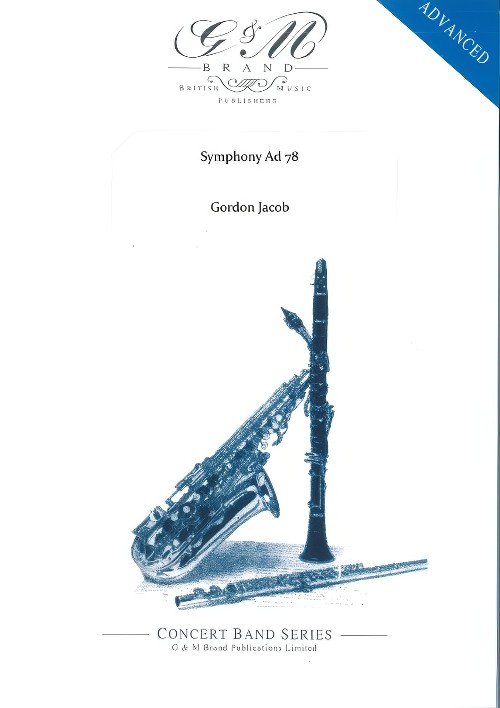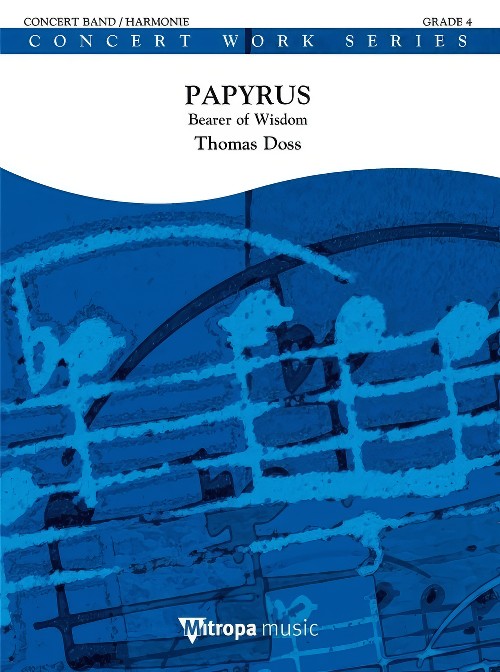Results
-
 £92.00
£92.00Domine ad Adiuvandum (Organ Solo) - Claudio Monteverdi
Estimated dispatch 7-14 working days
-
 £193.30
£193.30Fusions Majeures, Batterie Fanfare Ad Lib - Alain Crépin
Estimated dispatch 7-14 working days
-
 £87.50
£87.50Lean On The Ground, Batterie Fanfare Ad Lib - Alain Crépin
Estimated dispatch 7-14 working days
-
 £144.95
£144.95Symphony Ad 78 (Concert Band - Score and Parts) - Jacob, Gordon
A powerful work. An opening fanfare leads directly to an Allegro risoluto, which exudes determination and forthrightness. The second movement follows without a break and is a continuous plaint in which the melody seems forever seeking resolution like a troubled soul searching for respite. Only in the closing bars does peace seem to take over. The final movement, marked Allegro non troppo, starts with a cheering fanfare that leads to a bright and breezy romp, with a rustic feel about it. When the fanfare reappears we are suddenly immersed in exaltations of joy that really give a feeling of optimism as we proceed to the end of the piece via a short Coda.
Estimated dispatch 7-14 working days
-
 £28.95
£28.95Symphony Ad 78 (Concert Band - Score Only) - Jacob, Gordon
A powerful work. An opening fanfare leads directly to an Allegro risoluto, which exudes determination and forthrightness. The second movement follows without a break and is a continuous plaint in which the melody seems forever seeking resolution like a troubled soul searching for respite. Only in the closing bars does peace seem to take over. The final movement, marked Allegro non troppo, starts with a cheering fanfare that leads to a bright and breezy romp, with a rustic feel about it. When the fanfare reappears we are suddenly immersed in exaltations of joy that really give a feeling of optimism as we proceed to the end of the piece via a short Coda.
Estimated dispatch 7-14 working days
-
 £72.99
£72.99 -
 £139.99
£139.99Papyrus - Thomas Doss
The history of paper ranges over more than five thousand years: likely starting around 3500 BC in old Egypt with the use of papyrus. The oldest findings of written paper date from 2700 BC. In China, the first production of paper took place in the year 105 AD. The Arabs acquired their knowledge of the art of making paper around 750 AD, thanks to Chinese prisoners of war. Around the same time, the Celtic Ogham script was created in Ireland and carved into stones or trees. In Europe, the first paper mill was not put into operation until the 12th century! No matter how different the production methods and its historical use, paper was always a way to pass on wisdom, art and knowledge. Even today, in the age of digitalisation, paper still has a somewhat 'sacred' image. With Papyrus, Thomas Doss has written a wonderful composition in which the history of paper is reflected, and listeners can very much hear the various periods of this history represented throughout the piece.
Estimated dispatch 7-14 working days
-
£129.99
A Jupiter Fantasy (from the Planets) - Yasuhide Ito
Utilizing the melody from the central section of Holst's "The Planets: IV. Jupiter", I have exclusively written a chorus piece for an event in 1999. Based on that particular piece, a duo for piano and flute was written the same year. Later, more than a total of 30 renditions were written based on the original piece.This version of "Jupiter", arranged for the large wind band, is one of three parts of a three-part composition, which includes "Mars" and "Earth", composed in 2003 and 2005 respectively.The trumpet ad lib kicks off the central section, in which various other instruments could repeatedly perform the section, and ad lib is most welcome too.(Yasuhide Ito)
Estimated dispatch 7-14 working days
-
 £75.50
£75.50The Dream of Tiberius - David Campo
The Roman Emperor Tiberius was born in 42 BCE to Tiberius Claudius Nero and Livia Drusilla, both descendants of prestigious political families, at a time when Rome was undergoing significant political upheaval. Julius Caesar had begun a brutal civil war in 49 BCE to end Rome's rule as a Republic and consolidate his power as supreme ruler. Following Caeser's assassination in 44 BCE, Tiberius' father backed the forces wishing to return Rome to a Republic, but they were defeated by Caesarian loyalists led by Caeser's heir Octavian. As a result, Tiberius' early life was spent on the run and in political exile with his parents. In 27 BCE, Octavian would become the first Emporer of Rome and assume the name Augustus. Augustus forced Tiberius' parents to divorce and took Tiberius' mother as his new bride, separating the family and forcing Tiberius to live with his father. Upon his father's death, Tiberius went to live with his mother and Emporer Augustus, a situation Tiberius found extremely uncomfortable but one over which he had no control. Having been adopted by the Emperor, Tiberius assumed the military and political life thrust upon him. He proved to be an outstanding military and political leader, and with his marriage to Vipsania Agrippina his life took on a heretofore unknown stability. However, Augustus would intervene in Tiberius' life once more, forcing him to abandon his happy marriage and take Augustus' daughter Julia (Tiberius' step sister) as his new wife. This arrangement, while securing Tiberius' place as Augustus' heir and ensuring he would one day be Emperor of Rome, was disastrous. Julia's drunken licentiousness was a constant source of scandal and embarrassment for Tiberius (and her father, the Emperor) and she was eventually exiled by her father Augustus. Tiberius was named Emperor of Rome upon the death of Augustus in AD 14, assuming his position as the most powerful man on Earth. However, no matter how powerful he had become, Tiberius never felt as if he had ever had any control over his life, having been manipulated from childhood through adulthood by the whims of Augustus. As Emperor, he soon became disgusted with the political intrigue of the Roman Senate and by AD 26 left Rome and took up residence on the island of Capri, where he lived out the rest of his life. History does not regard Tiberius fondly and by all accounts towards the end of his reclusive life on Capri, he had become a miserable, sick and mentally unstable old man reveling in debauchery and cruelty. It is also informative to note that he was Emperor of Rome when Jesus of Nazareth was crucified, and while there is no indication that Tiberius was even aware of the existence of Jesus, as Emperor he was responsible for the appointment of Pontius Pilate as Governor of Judea. Even considering this, it is difficult to look on the life of the Emperor Tiberius and not feel some sympathy and pity. It's in this spirit that I composed "The Dream of Tiberius." I imagine the man sitting in thoughtful seclusion on the beautiful island of Capri imagining what his life might have happily been had not power been thrust upon him: husband, father and humble servant of the people.
Estimated dispatch 7-14 working days
-
 £139.99
£139.99Papyrus (Bearer of Wisdom) (Concert Band - Score and Parts) - Doss, Thomas
The history of paper ranges over more than five thousand years: likely starting around 3500 BC in old Egypt with the use of papyrus. The oldest findings of written paper date from 2700 BC. In China, the first production of paper took place in the year 105 AD. The Arabs acquired their knowledge of the art of making paper around 750 AD, thanks to Chinese prisoners of war. Around the same time, the Celtic Ogham script was created in Ireland and carved into stones or trees. In Europe, the first paper mill was not put into operation until the 12th century! No matter how different the production methods and its historical use, paper was always a way to pass on wisdom, art and knowledge. Even today, in the age of digitalisation, paper still has a somewhat 'sacred' image. With Papyrus, Thomas Doss has written a wonderful composition in which the history of paper is reflected, and listeners can very much hear the various periods of this history represented throughout the piece. Duration: 8.30
Estimated dispatch 7-14 working days
